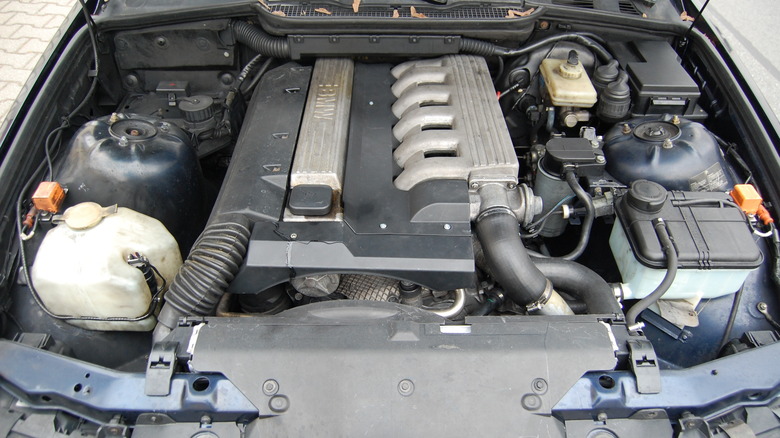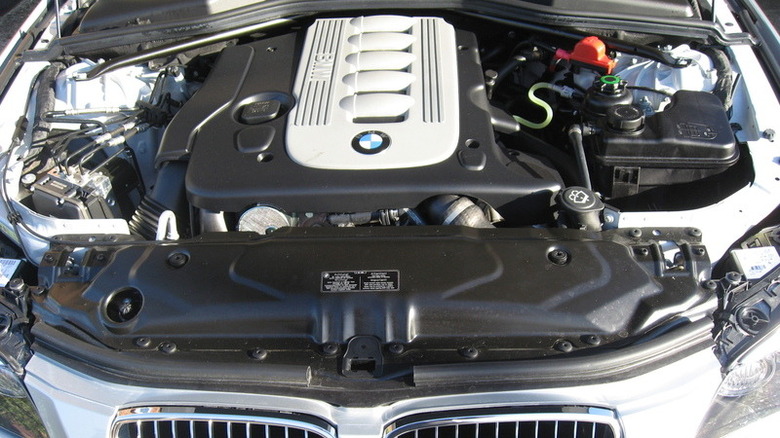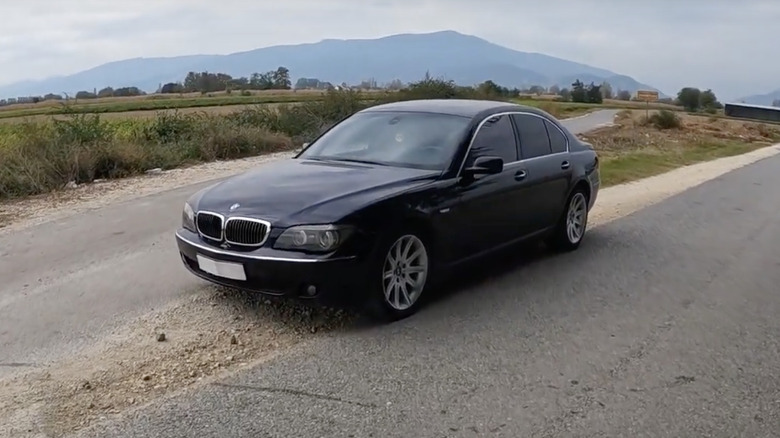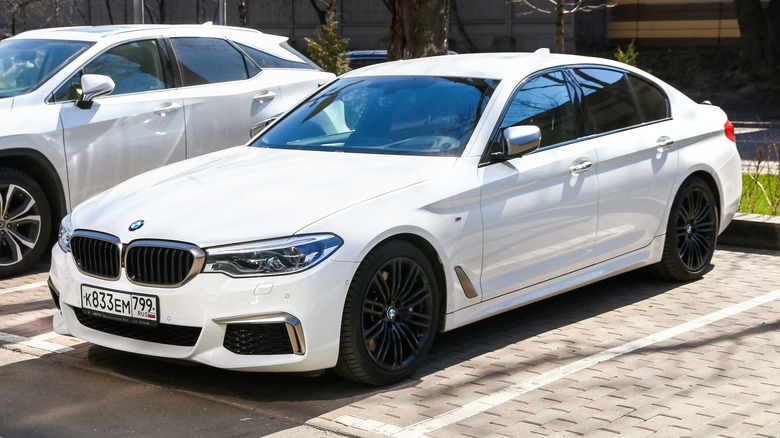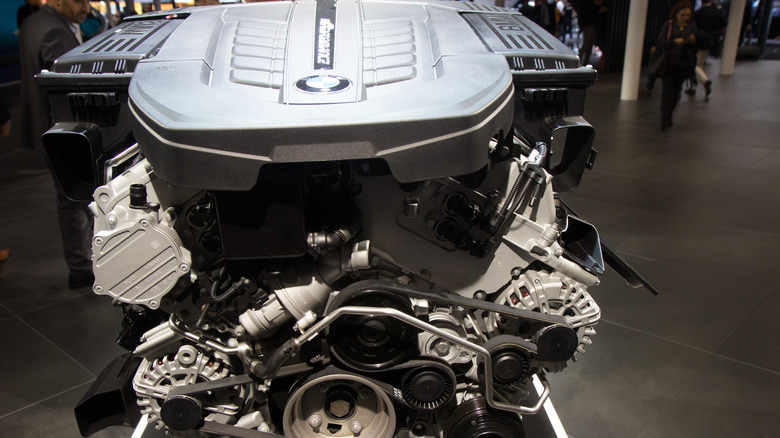5 Of The Most Powerful Diesel Auto Engines Ever Built By BMW
BMW has dropped some potent engines under the hoods of its cars and SUVs over the years, from inline-four cylinder dynamos like the E30 M3's 2.3-liter beast to the exclusive but elite group of V12s that drove a handful of highly-coveted BMWs. BMW has cranked out its share of diesel engines as well, including the M57, which had a 13-year shelf life and existed in three different forms.
The M57 earned a well-deserved spot on our top ten list of the auto industry's most reliable diesel powerplants, and BMW has also spent lots of research and development funding and hours making diesel engines that make impressive numbers on the dynamometer. We have crawled through BMW's extensive engine catalog to pull out the most powerful diesel engines that ever sat behind that familiar blue-and-white circular emblem, so seek out these high-torque engines if you're looking for something that will run long (and strong) under the hood of your Beemer.
The M51 was an early BMW diesel workhorse
BMW's M51 series inline six-cylinder diesel engine might not have the most impressive stats on paper, but this engine was strong for its era and had some advanced features that paved the way for later, stronger BMW diesels. The M51 was produced from 1991 through 2000 and used in an assortment of 5 and 7-series cars and the late '90s Land Rover Range Rover 2.5 DSE. This 2.5-liter engine used direct injection to feed fuel to the cylinders, a technology that had been used by automakers since the 1950s but had not yet been implemented widely during the M51's era.
Some versions of the M51 inline six used an intercooler, which lowers the temperature of the compressed air being fed to the engine. This enabled a power output of 134 horsepower. That was only two less than that of the diesel engine in the 2007 Isuzu D-Max, which displaced the same 2.5 liters as the M51.
[Featured image by Christian Gerbig via Wikimedia Commons|Cropped and scaled|CC-BY SA 4.0]
The M57 was BMW's next step in diesel engine evolution
Late in the 1990s, the M57 supplanted the M51 in BMW's diesel engine lineup. It's famous for its performance and reliability and was used across BMW's range of cars and SUVs, beginning with the 2009 335d. The M57 came in three displacements ranging from 2,497 to 2,993 cubic centimeters. Output was anywhere from 148 horsepower and 221 pound-feet of torque for the smallest variant to the 282 horsepower and 428 pound-feet produced by 2007 and later versions of the twin-turbo, three-liter M57.
The 2009 335d with the M57 was a bit of a performance juggernaut, capable of a 5.7-second 0-60 sprint time and quarter-mile runs in the low 14s. M57-equipped BMW owners have found ways to wring even more performance and efficiency from these engines in the years since, and aftermarket improvement options are plentiful. Upgrades to the software, injectors, turbocharger, and intercoolers can boost output to more than 700 horsepower, all while retaining the beefy stock lower end.
Late versions of the M67 put out over 300 horsepower
BMW's diesel engine development continued with the M67 series, which was in production from the late '90s through the mid-2000s. This V8 was issued in several variants in displacements from 3.9 to 4.4 liters and was used in various 7 series models throughout its run. The most powerful M67 was the D44 variant produced in 2006, which put out 329 horsepower and a whopping 552 pound-feet of torque.
It was used in the facelifted version of the 745D, a car that rivaled the later 335d in terms of performance despite weighing nearly 4,500 pounds. The 745D could go from 0-60 in 5.8 seconds and cover a quarter mile in 14.2 clicks, pretty good numbers for a luxury sedan. Software limited its top speed to 155 miles per hour and helped deliver fuel economy of 18.4 miles per gallon in the city and 34.6 on the highway.
The M550D had a quad-turbo inilne six diesel engine
BMW made history with the M550d xDrive. The G30 version of this sedan, produced between 2017 and 2020, had a 3.0-liter inline six-cylinder diesel engine with four turbochargers (no, not a typo) that produced 400 horsepower and an unholy 561 pound-feet of torque. That was enough to get the M550d from 0-100 km/h (62 miles per hour) in 4.4 seconds and land it a spot on our list of some of the fastest diesel-powered cars of all time. The four turbos weren't there for overkill; they helped eliminate frustrating turbo lag and ensured a smooth delivery of power across the engine's rev range.
330 pound-feet of torque were available at 1,000 revolutions per minute, and the peak number came at just twice that engine speed. The two smaller turbos handled low-end power, while the larger two kicked in at higher RPMs. One of the bigger pair slept until called upon by the driver's right foot, when it would scream to life to deliver some extra horses. This innovative setup made this the most powerful production six-cylinder diesel ever and helped keep its average fuel economy above 45 miles per gallon.
The N74 V12 was an absolute beast
BMW's innovation in diesel engine technology didn't stop with the quad-turbo inline-six powerhouse. Over the years, BMW has cranked out four generations of impressive V12 engines, including the N74 diesel. That last engine went under the hoods of select 7 series and Rolls-Royce models, including the 2022 M760i, which was the last Beemer to get a V12 of any kind. It was ultimately another casualty of the electrification of the automotive industry, but BMW offered up 12 last copies of the M760i to lucky buyers who had upwards of $200,000 to secure one.
That pile of cash got you an engine with double VANOS variable valve timing, direct fuel injection, and twin turbochargers. All that tech pushes the N74's output to a bone-shaking 601 horsepower, which goes to all four corners via an eight-speed automatic transmission and BMW's venerated x-Drive system. The impressive drivetrain makes the M760i good for a 3.6 second 0-60 sprint, a time that's less than half a second behind that of the legendary McLaren F1.
[Featured image by Olaf Kosinsky via Wikimedia Commons|Cropped and scaled|CC-BY SA-3.0 DE]

